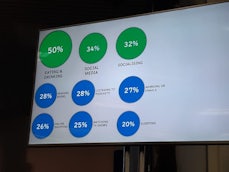November Algorithm Update & Search Industry News
For those working in search, November was a relatively stable and uneventful month. Google, the world’s largest search engine, rolled out another suspected broad core algorithm update towards the start of the month, with many SEOs seeing large fluctuations in rankings. Other notable industry updates include webmasters reporting fluctuations in local rankings, and Google rolling out new features for Google Search Console.
We will be monitoring the effect of these updates in the coming weeks and will report back in next month’s blog post.
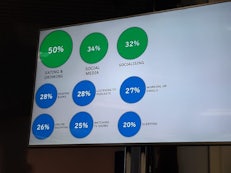 November Update 2019
November Update 2019
Google is suspected to have rolled out a significant algorithm update at the start of November, with the effects being felt across a wide range of industries. The search engine giant has made no official statement on the reports, as usual.
Nevertheless, Google has officially stated that it does not target specific industries with its algorithm updates, meaning that any industries that saw particularly large fluctuations should not feel singled-out.
Google’s algorithm updates seek to improve the relevancy and usefulness of its results, and will test broad criteria in each new update. The fact that a number of verticals saw particularly large fluctuations is merely coincidence.
Reports of fluctuations were mostly negative, with travel, food and lifestyle blogs being the most vocal.
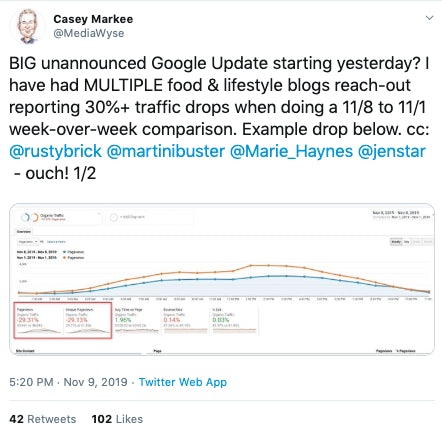
Interestingly third-party tool SEMrush Sensor did not see evidence for these fluctuations, in the UK and the US.
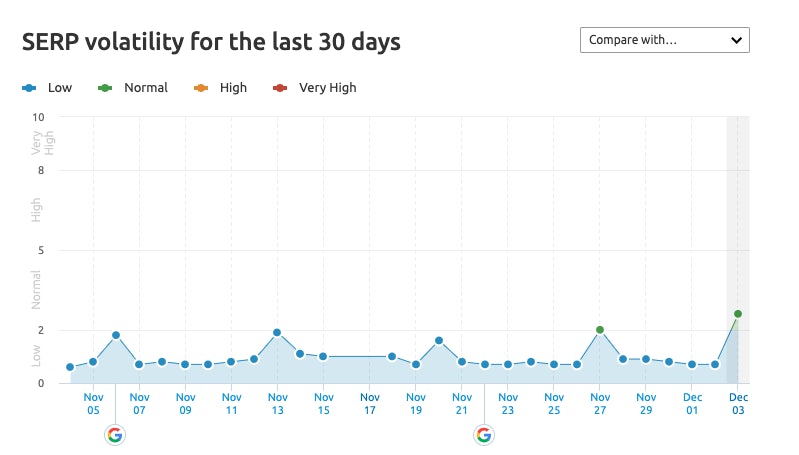
An image showing SERP volatility in the US (Semrush Sensor)
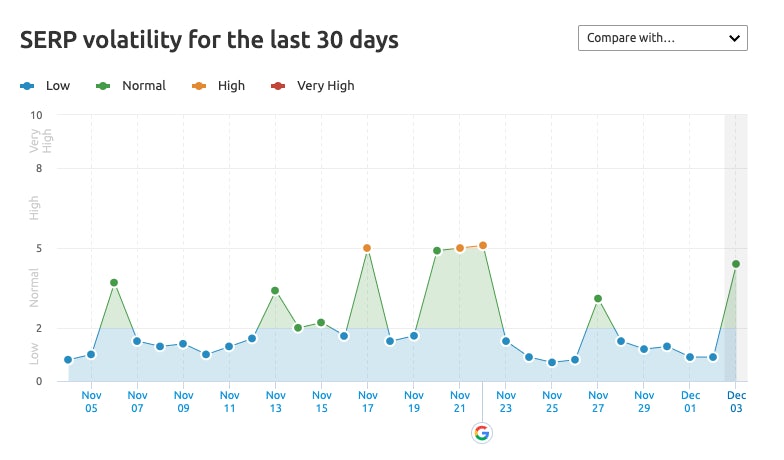
An image showing SERP volatility in the UK (SEMrush Sensor)
Reports of fluctuations like these are occurring on a monthly basis, and as ever our recommendations are to focus on the quality of your content and to conduct competitor reports to identify any content gaps. More detailed advice on recovering from algorithm updates can be found below.
Local Algorithm Update
Towards the beginning of November (06.11.19) within the local SEO community there was talk of businesses in Google’s map pack experienced a drop in the SERP rankings. To confirm this, BrightLocal’s Rank Flux data, that detected fluctuations within the local online search landscape, saw increased volatility within the local SERPs across the week of 4th November.
Today’s #LocalRankFlux Score – It’s Huge…4.7/10https://t.co/5QzlhleO4x
— Kabeer Ghanchi (@kabeertweets) November 7, 2019
This local algorithm update has been regarded as the biggest since 2016. In 2016, Google rolled out the “Possum” update which required websites to be more vigilant about fighting spammy areas. Google determined that user location was the most significant ranking signal and the business location was more likely to show up if it was closer to the user performing the certain search query.
In 2019, Google is reinforcing the location based signal. This update was another proximity update with businesses that are closest to the user performing the search, winning. The initial rollout of the update was extreme to the businesses affected – some even dropped out of the Map rankings entirely. Over the next few days, it appeared that Google might have felt it was too aggressive and made some adjustments with some businesses’ rankings restoring.
Fast forward to now, it looks as if the post-update adjustments have ceased. This means that the new ranks for businesses is the rank that it is likely to stay.
If your local business has lost rankings, we recommend to not go in and make rash changes. This can cause more problems than not. Because this update has used proximity as a rank signal, SEOs should anticipate an increase in spam listings. Google’s Business Redressal Complaint Form is your friend.
With this new local update, now is the perfect time to collaborate with your PPC team. If your business relies on local SEO, you might find that a refined focus on Google Ads might be needed to quickly extend your service radius. To break the ice with your PPC team, why not check out Nathan’s new Google Ads location targeting script?
 Google Search Console Expanding Features
Google Search Console Expanding Features
Since officially rolling out the new version of Search Console in May 2019, Google has made a number of improvements to the tool. November saw the search engine giant releasing a series of new data sources for SEOs to analyse, the first of which being a new ‘Speed’ report.
After testing the functionality with a select group of users, the new report was fully rolled out in the first week of November. The report is located under the “Enhancements” section of Google Search Console and highlights potential speed performance issues to tackle.
Despite being a useful tool, the report should be taken with a pinch of salt, as Google’s analysis of page speed portrays an unfairly harsh portrayal of speed due to its testing methods. Webmasters should look to analyse site speed using a range of third-party tools to get the clearest picture of the priority site speed issues to tackle.
The second major update to Search Console was its new report detailing the visibility of product rich results. The data can be found in the Search Appearance module in the report, which presents data on metrics like clicks, impressions and average click-through rate.
Any websites that are eligible to appear in the product search results will see the new type of Search Appearance called ‘Product Results’.
Source: Search Engine Journal
The new report can be used to discover how shopping traffic changes over time and which results search queries product results show up for.
Quick recap on Google’s advice for sites impacted by core updates
To offer consolidation to SEOs whose sites had suffered, Google pointed to the same advice it gave in 2011 post-Panda update. They advised to self-assess your site to see if you offer quality content to users.
In August 2019, Google offered a fresh set of questions for webmasters to ask themselves surrounding four different areas:
Content and quality questions
- Does the content provide original information, reporting, research or analysis?
- Does the content provide a substantial, complete or comprehensive description of the topic?
- Does the content provide insightful analysis or interesting information that is beyond obvious?
- If the content draws on other sources, does it avoid simply copying or rewriting those sources and instead provide substantial additional value and originality?
- Does the headline and/or page title provide a descriptive, helpful summary of the content?
- Does the headline and/or page title avoid being exaggerating or shocking in nature?
- Is this the sort of page you’d want to bookmark, share with a friend, or recommend?
- Would you expect to see this content in or referenced by a printed magazine, encyclopedia or book?
Expertise questions
- Does the content present information in a way that makes you want to trust it, such as clear sourcing, evidence of the expertise involved, background about the author or the site that publishes it, such as through links to an author page or a site’s About page?
- If you researched the site producing the content, would you come away with an impression that it is well-trusted or widely-recognized as an authority on its topic?
- Is this content written by an expert or enthusiast who demonstrably knows the topic well?
- Is the content free from easily-verified factual errors?
- Would you feel comfortable trusting this content for issues relating to your money or your life?
Presentation and production questions
- Is the content free from spelling or stylistic issues?
- Was the content produced well, or does it appear sloppy or hastily produced?
- Is the content mass-produced by or outsourced to a large number of creators, or spread across a large network of sites, so that individual pages or sites don’t get as much attention or care?
- Does the content have an excessive amount of ads that distract from or interfere with the main content?
- Does content display well for mobile devices when viewed on them?
Comparative questions
- Does the content provide substantial value when compared to other pages in search results?
- Does the content seem to be serving the genuine interests of visitors to the site or does it seem to exist solely by someone attempting to guess what might rank well in search engines?
Google also recommended having a look at their Quality Raters Guidelines, focusing on the E-A-T section. They said:
“If you understand how raters learn to assess good content, that might help you improve your own content. In turn, you might perhaps do better in Search… Reading the guidelines may help you assess how your content is doing from an E-A-T perspective and improvements to consider”
It is important to remember that there is no “fix” for websites after a core update. Google likened a core update to getting on a Top 100 Movies list for 2015. When you refresh the list in 2019, some of the films would naturally not be at the top anymore.

